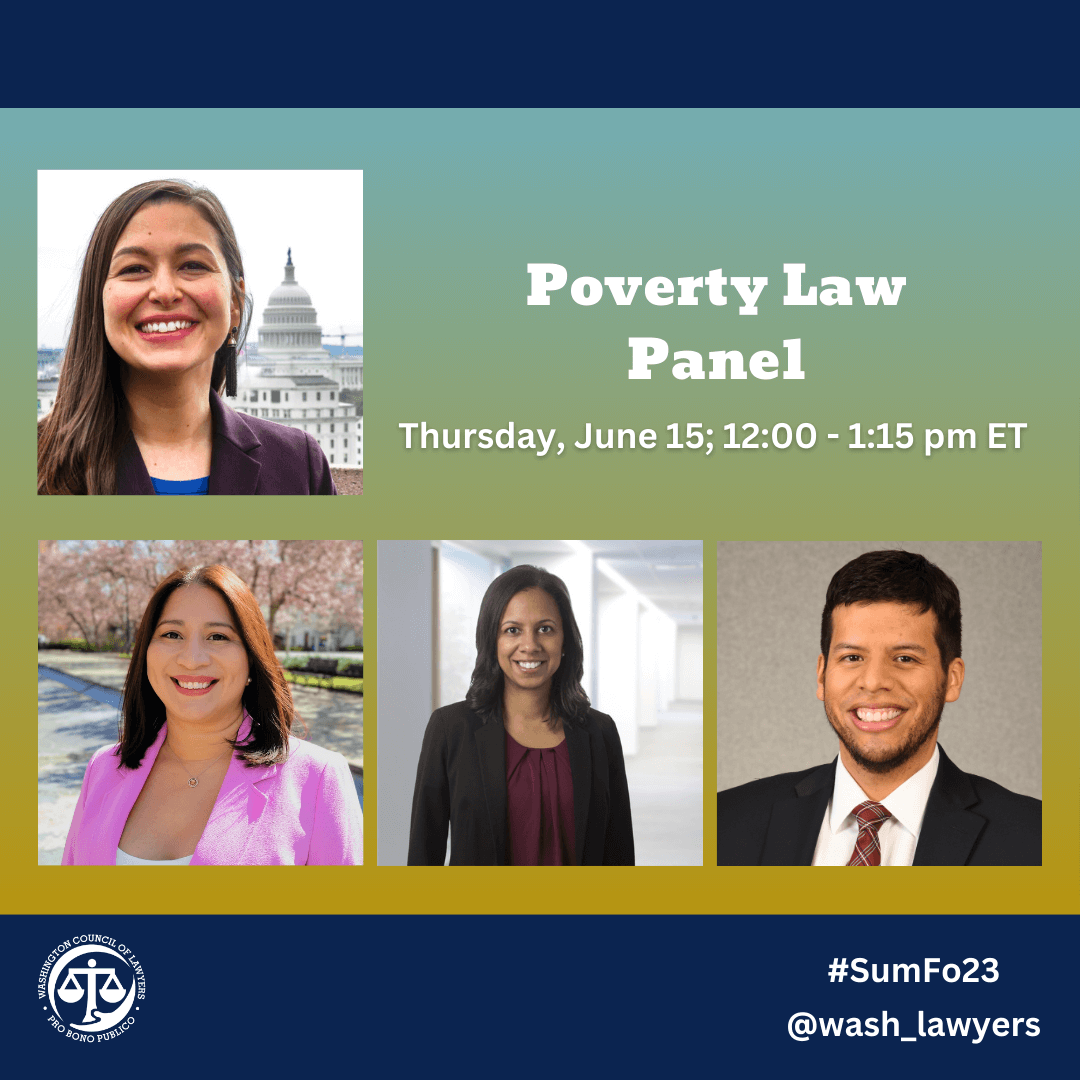
2023 Summer Forum: Assisting Individuals and Communities in Need
Our Summer Forum substantive panels continued on Thursday, June 15 with the Poverty Law Panel. This conversation focused on career paths in poverty law, the intersection of poverty law and racial justice as well as access to justice and concluded with tips for how to get involved wherever you are!
Our Poverty Law panel was moderated by Jen Masi, the Pro Bono Director at the Children’s Law Center (CLC). Our panelists include Aida Vindell, Co-Legal Director at DC Volunteer Lawyers Program (DCVLP); Sébastien Monzón Rueda, Litigation Attorney at the AARP Foundation Litigation; and Harmony Jones, Pro Bono Counsel at Steptoe & Johnson (Steptoe). Tracey Goodman, leader of the Healthy Together medical-legal partnership at CLC could not join us for the panel, however, our moderator Jen gave insight from the CLC. You can learn more about our panelists here.
The conversation began with panelists discussing their career paths to illustrate the many opportunities to engage with poverty law and assist low-income individuals and families. Harmony emphasized thinking of yourself as a public interest attorney no matter where you are in your career because then you’ll be open to opportunities to do good. Harmony’s career path wasn’t so direct, she began her career working at Legal Aid in DC and moved to the Neighborhood Legal Services Program where she gained a variety of experiences supporting the DC community. Then she transitioned to Steptoe where she serves as Pro Bono Counsel, a position she didn’t know existed when she began her career.
Aida provides an example of moving within the legal services provider organizations as her prior experience resided with CLC and Ayuda before her current position at DCVLP. Aida spoke about how important it is to check in with yourself throughout your career. Public interest work can tap into one’s emotions and either motivate them or drain them. When she found immigration work tapped into emotions that were draining her, she pivoted to another area of public interest to continue serving the public good.
The conversation led to how other lawyers can get involved in public interest opportunities. Panelists highlighted how legal service providers, like the CLC, DCVLP, and the AARP Foundation, are often hiring including ongoing internship and fellowship opportunities for undergraduate and law students. Harmony encourages everyone at a firm to get in contact with their pro bono professionals. Our panelists also encourage law students to see how they may be able to volunteer with organizations. Aida explained how CPO cases increased during the pandemic and law students assisted in meeting the demand by helping with filings under the supervision of lawyers.
Our conversation took a step back to analyze the intersection of poverty law and racial justice. Every panelist discussed the importance of client-centered lawyering and the real impact that we as lawyers can have on breaking down racial inequality in our systems. Our panelists discussed how racism is institutionalized in cycles of oppression. Poverty disproportionately impacts communities of color and our legal system has historically supported that unfairness. For example, housing laws have historically been racist; communities that experienced redlining now experience greater rates of eviction. These communities have greater housing instability, lower access to quality healthcare, and education systems often lack necessary resources.
We turned then to how all of that plays into access to justice. Our panelists agreed that their clients are the experts in their issues and that the role of public interest attorneys is to assist folks not literate in the legal system navigate their legal issues. That assistance focuses on creating an understanding of what their client’s rights are, how to access and enforce them, and what protections they are entitled to under the law. Public interest organizations assist folks without the means to access a lawyer to get assistance in navigating the legal system and pro bono service with these organizations fills the gap in capacity between the needs of the community and what the organizations can reasonably handle. In terms of access to justice, it’s important to remember that everyone is seen as equal under the law but the legal system is not equal because not all people know how to exercise their rights.
Our panel concluded with a call to action and tips to head that call. It is the responsibility of those that are legally trained to help those who are not are not navigating the legal system. Providing pro bono services not only fillsl the access to justice gap but because it is the responsibility of all attorneys to eradicate the issue. When navigating how to get involved our panelists encourage you to reach out to legal professionals and get insight into what their experiences are so you can find the best place for your skills and talent in the public interest field. Finally, don’t limit yourself. Your career can be whatever you make of it and pro bono opportunities follow a wide range. Explore what’s out there before you decide you know what you’re going to do next. You may be able to have a bigger impact than you could have ever imagined.






